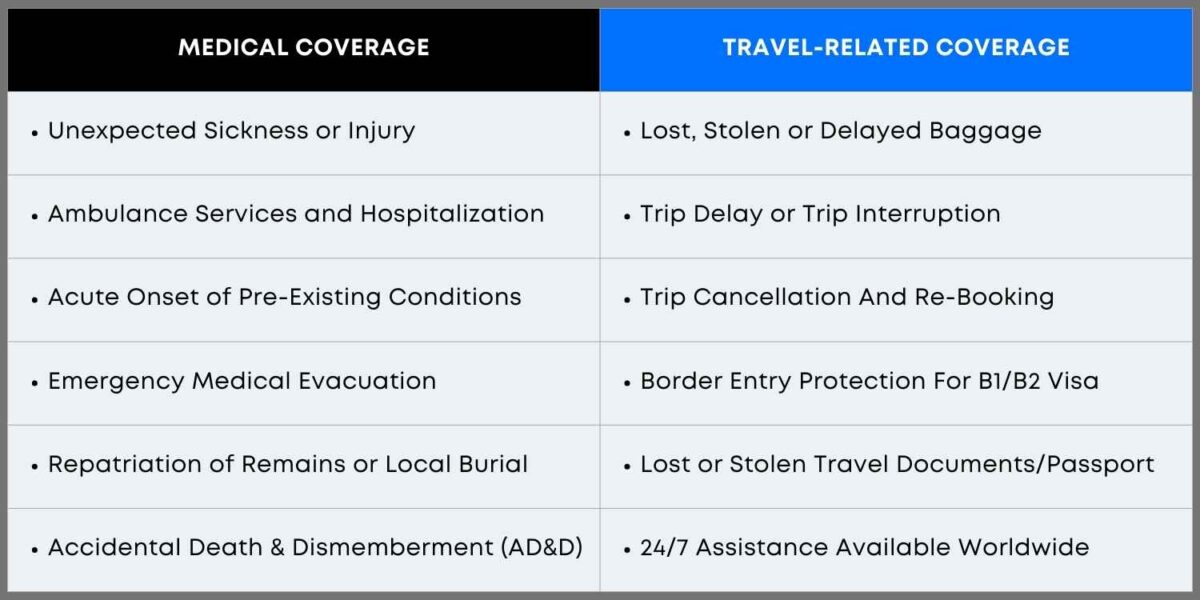International Travelers Guide To Optimal Travel Medical Insurance

In a post-pandemic world, the significance of travel medical insurance has increasingly become more important in a globalized world.
International travel has become more accessible and prevalent than ever before, be it business travelers, leisure travelers, vacation seekers, solo travelers or groups, parents children, or seniors everyone must know the significance of travel medical insurance.
Whether you’re embarking on a short vacation or planning an extended trip abroad, unforeseen unexpected medical emergencies can disrupt your plans and result in significant financial burdens.
In this comprehensive guide, we’ll delve into the intricacies of this insurance, exploring its importance, coverage options, key considerations, and tips for selecting the right travel health insurance policy.
Here are the top 10 reasons to purchase travel insurance.
What Is Travel Medical Insurance?
Travel medical insurance is also known as emergency medical insurance or travel health insurance.
Synonymously referred to as Trip Cancellation, Trip Interruption, or Trip Insurance, understanding the similarities and differences between travel medical insurance and trip insurance is helpful.
International travel medical insurance provides medical coverage and travel-related coverage.

International Travel Medical Insurance – Medical Coverage
This type of insurance provides medical coverage for unexpected medical emergency expenses like an unexpected illness or injury that requires treatment during a trip, or if they need hospitalization in a foreign country.
For situations needing emergency medical evacuations, repatriation of remains in case of death of the insured, and other eligible expenses covered by the policy.
It serves as primary coverage on international plans, offering benefits such as reimbursement for lost travel expenses and coverage for emergency medical care.
International Travel Medical Insurance – Travel-Related Coverage
Travel-related risks are generally offered as part of the coverage package by the insurance provider. Trip cancellations, trip interruption, or trip Delay all add to the trip cost.
Some international travel medical insurance plans also provide unique coverages like border entry protection for the USA, where for some reason if a B-1/B-2 visa holder is denied entry to the USA then a return airfare is covered by the plan.
The limits are usually for a one-way fare in the economy class with a cap of up to appx. $500

Importance Of Travel Medical Insurance
Travel medical insurance serves as a safety net for travelers. It provides financial protection and peace of mind in the face of medical emergencies. Here’s why it’s essential:
- Financial Protection: Medical treatment abroad can be exorbitant, and without insurance, travelers may be left to foot the bill themselves. Travel medical insurance covers expenses such as hospitalization, surgery, medication, and emergency medical evacuation, shielding travelers from unexpected costs.
- Emergency Assistance: In unfamiliar territories, navigating healthcare systems and finding quality medical care can be daunting. Many policies offer 24/7 assistance services, including access to multilingual representatives. These representatives can help coordinate medical treatment and evacuation if necessary.
- Travel Requirements: Some countries require visitors to have valid travel medical insurance as a condition of entry. Without adequate coverage, travelers may face difficulties at immigration checkpoints or be denied entry altogether.

Travel Medical Insurance Options For Parents Visiting USA From India
For parents visiting the U.S. from India. They have the option to get travel health insurance coverage from a travel insurance provider based in India or the USA. This also applies to USA visitors from any other country.
There are benefits to buying coverage from an insurance provider based in the USA. Some of the popular plans from the USA include:
Top-Rated Comprehensive Coverage Plans:
Atlas America: Provides comprehensive coverage for non-U.S. citizens traveling outside their country, including trips between 5 and 364 days long. Offers coverage for Acute onset of pre-existing medical conditions for individuals below 80 years of age.
Patriot America Plus: Offers trip protection benefits such as trip interruption, lost baggage, and accidental death and dismemberment. Offers coverage for Acute onset of pre-existing medical conditions for individuals below the age of 70.
Safe Travels USA Comprehensive: A very popular plan for non-U.S. residents traveling to the USA, for trips of 5 days to 364 days. Offers coverage for Acute onset of pre-existing medical conditions.
Compare Travel Medical Insurance Plans
Top-Rated Fixed Benefit Plans:
Visitors Care: Provides pre-defined amount for medical coverage for each covered medical benefit, for trips between 5 and 364 days. Offers coverage for Acute onset of pre-existing medical conditions.
VisitorsSecure: Provides pre-defined amount for medical coverage for each covered medical benefit, for trips between 5 and 364 days. Offers coverage for Acute onset of pre-existing medical conditions.
Pre-Existing Medical Conditions Coverage Plans:
INF Visitor Insurance offers USA travel insurance plans for parents with full coverage for pre-existing ailments.
INF Elite: A comprehensive plan for non-U.S. residents for trips of a minimum of 90 days to 364 days. This plan needs to be purchased before departing the home country.
The plan offers coverage for pre-existing medical conditions
INF Premier: Provides pre-defined amounts for medical costs and emergency services to non-U.S. residents traveling outside their home country to the U.S., for trips between 90 days to 364 days.
The plan offers coverage for pre-existing medical conditions, this plan needs to be purchased before departing the home country.
See Travel Insurance Plans that cover Pre-existing Conditions
When choosing a travel insurance policy for your parents, consider their specific needs and look for coverage for pre-existing conditions if they have existing medical ailments.

What Does Travel Medical Insurance Cover?
Travel medical insurance policies vary in coverage and scope, but they typically include the following components:
- Medical Expenses: Coverage for hospitalization, physician services, surgery, prescription drugs, and other necessary medical treatments incurred during the trip.
- Emergency Medical Evacuations: Coverage for transportation to the nearest adequate medical facility or repatriation to the traveler’s home country in the event of a medical emergency.
- Repatriation of Remains: Coverage for the return of the traveler’s remains to their home country in the unfortunate event of death during the trip.
- Trip Interruption/Cancellation: Optional coverage that reimburses non-refundable trip expenses if the trip is canceled or interrupted due to covered reasons such as illness, injury, or death of the traveler or a family member.
- Emergency Dental Treatment: Coverage for emergency dental treatment resulting from an injury sustained during the trip.
- Accidental Death and Dismemberment: Coverage for accidental death or permanent disability resulting from a covered accident during the trip.
- Lost or Stolen Items: Some plans may cover the cost of replacing lost or stolen items, such as passports or luggage, due to a covered medical emergency
Key Considerations
When selecting a travel medical insurance policy, consider the following factors to ensure adequate coverage:
- Destination: Different regions may have varying levels of healthcare quality and cost. Research the healthcare infrastructure and medical expenses in your destination country to determine the appropriate level of coverage.
- Duration of Travel: Some policies have maximum trip duration limits, so ensure that the policy duration aligns with the length of your trip. For long-term travelers or digital nomads, consider annual multi-trip policies that provide continuous coverage for multiple trips throughout the year.
- Pre-existing Conditions: Be aware of any pre-existing medical conditions exclusions or limitations in the policy. Some insurers may offer coverage for stable pre-existing conditions or allow for optional upgrades for additional coverage.
- Coverage Limits and Deductibles: Review the policy’s coverage limits, deductibles, and co-insurance provisions to understand your out-of-pocket expenses in the event of a claim. opt for a policy with higher coverage limits and lower deductibles for comprehensive protection.
- Exclusions and Limitations: Familiarize yourself with the policy’s exclusions and limitations, such as adventurous activities exclusions, high-risk destinations, or coverage restrictions during pandemics or acts of terrorism.

Tips For Selecting The Right Policy
To find the most suitable travel medical insurance policy for your needs, consider the following tips:
- Compare Quotes: Get quotes and compare coverage options, premiums, deductibles, and policy features to find the best value for your money.
- One Plan for Multiple Destinations: If you are traveling abroad to more than one country ensure your travel insurance benefits are available in all countries you are visiting
- Multi-Trip Plans: If you are or plan to travel frequently, you can opt for multi-trip plans instead of one international health insurance plan per trip
- Read the Fine Print: Thoroughly read the policy documents, including terms and conditions, exclusions, and limitations, to understand the coverage in detail and avoid surprises during claims.
- Seek Recommendations: Ask for recommendations from fellow travelers, travel bloggers, or online forums to identify reputable insurers with positive customer feedback and reliable claims processing.
- Consider Add-Ons: Evaluate optional add-on coverage options such as adventure sports coverage, trip cancellation/interruption insurance, or coverage for high-value items like electronics or photography equipment.
- Check for Travel Advisories: Stay informed about travel advisories and warnings issued by government agencies for your destination country. Some insurers may restrict coverage or impose higher premiums for travel to high-risk areas.
Different Types Of Travel Medical Insurance Plans
Travel medical insurance plans cater to different needs and durations of travel. Here are some common types:
Travel Medical Plans
- Designed for emergency medical care outside the home country
- Ideal for travelers not concerned about trip-related coverage
- Offer emergency medical benefits and assistance services
Travel Major Medical Plans
- Intended for long-term travelers or those abroad for six months or more
- Resemble traditional health insurance with routine and prescription drug benefits
- Provide coverage beyond emergency medical care, including non-emergency medical benefits
Comprehensive Travel Insurance
- Includes trip cancellation, interruption, and lost baggage coverage
- Suitable for travelers seeking robust coverage beyond medical emergencies
International Emergency Medical Insurance
- Focuses on medical and evacuation aspects, offering services like emergency medical evacuation.
- Some plans may include limited trip protection benefits such as Trip Interruption and Baggage Loss
Fixed Benefits Policy
- Offers limited coverage with fixed maximum amounts for each medical service or condition
- More affordable but provides basic coverage
Comprehensive Policy
- Provides extensive coverage but at a higher cost compared to fixed-benefit plans
- Offers robust protection for various travel-related risks
Understanding these different types of travel medical insurance plans can help travelers choose the most suitable coverage based on their specific needs and travel duration.
For more detailed information, it is recommended to consult with insurance providers or agents to determine the most appropriate plan for your travel requirements.

What Isn’t Covered By Travel Medical Insurance?
Travel medical insurance provides valuable coverage for a variety of medical emergencies and situations encountered during travel. However, there are certain exclusions and limitations to be aware of. Here are some common scenarios that may not be covered by travel medical insurance:
Pre-Existing Medical Conditions
Many travel insurance plans exclude coverage for pre-existing medical conditions, which are health conditions that existed before the effective date of the insurance policy. However, some insurers offer coverage for stable pre-existing conditions, subject to certain conditions and limitations.
Routine Medical Care
Travel insurance typically does not cover routine or preventive medical care, such as annual check-ups, vaccinations, or prescription refills for chronic conditions.
Elective Procedures
Procedures or treatments that are considered elective or cosmetic, such as elective surgery or cosmetic procedures, are generally not covered by travel insurance.
Injuries or Illnesses Resulting from Reckless Behavior
Injuries or illnesses resulting from reckless or high-risk behavior, such as participation in extreme sports or activities, may not be covered by travel insurance.
Non-Medical Expenses
Travel insurance is designed to cover medical expenses only. Non-medical expenses such as trip cancellation, lost baggage, or travel delays are typically not covered under this policy. However, travelers can purchase additional insurance coverage for these types of risks.
Treatment of Pre-Existing Injuries or Conditions
A treatment related to pre-existing medical conditions that were not stable before the trip may not be covered by travel insurance.
Medical Evacuation for Non-Medical Reasons
While travel insurance typically covers emergency medical evacuation to the nearest adequate medical facility, evacuation for non-medical reasons, such as political unrest or natural disasters, may not be covered.
Travel to High-Risk Countries or Regions:
Some travel insurance plans may exclude coverage for travel to countries or regions with high levels of political instability, civil unrest, or travel advisories issued by government authorities.
Travelers need to review the terms and conditions of their travel medical insurance policy carefully to understand the specific exclusions and limitations.
Additionally, travelers should consider purchasing additional coverage or riders to address specific concerns or risks that may not be covered by the standard policy.
Frequently Asked Questions About Travel Medical Plans
To be eligible for travel medical insurance, do I need to have primary health insurance in the U.S.?
It will depend on your immigration status, travel medical coverage plans may have exclusions for some category of visa holders. For a short-term visitor to the USA, you do not necessarily need to have primary health insurance in the U.S. Travel medical coverage is best for visitors who are non-US Residents and non-US Citizens.
If your plan is primary:
- You can submit a claim directly to the international health insurance (travel insurer) before any other insurer.
If your plan is secondary coverage:
- Before submitting it to the travel insurance company
- You will need to submit your claim to your primary health coverage provider first
It’s essential to understand the coverage type of your plan to determine if you need primary health insurance in the U.S. for eligibility
How much does travel medical insurance cost for visitors to the U.S.?
The cost of travel medical insurance for visitors to the U.S.:
- Can start from as low as $1 per day and
- Go up to several hundred dollars per month
The cost depends on several factors such as age, coverage duration, medical maximum, deductible, and plan type.
For example, a 70-year-old traveler from India coming to the U.S. for 90 days with coverage of $100,000 and a $250 deductible might pay around $331.65 for a travel medical insurance policy.
Does travel medical insurance cover pre-existing conditions?
Travel medical insurance coverage for pre-existing conditions varies among providers. Not all travel insurance plans cover pre-existing conditions due to the higher risk they pose for insurers.
Some specialized travel insurance plans do cover pre-existing conditions. Find the most suitable travel insurance plan that covers pre-existing conditions.
How far in advance should I purchase travel medical insurance for visiting the USA?
It is advisable to purchase travel insurance before you depart from your home country to ensure full coverage from day one of your trip.
While it is possible to buy international travel insurance after arriving at your destination country. It is recommended to start the plan the day you leave your home country until the day you return
Ideally, travelers should buy travel insurance no later than 15 days before their trip to maximize coverage and benefits. However, coverage can still be purchased after this timeframe, albeit at a potentially higher cost.
Purchasing travel insurance early allows for protection during the pre-departure period and ensures coverage for unexpected medical emergencies or accidents while traveling
Is travel health insurance ever required?
Travel health insurance is not always mandatory for travel. However, Some countries do require travelers to have proof of medical coverage before entry.
Countries like Jordan, Laos, Nepal, Qatar, and others have made travel medical insurance mandatory for visitors.
While it is generally not mandatory for U.S. citizens to have travel insurance, the U.S. government strongly recommends coverage for emergency medical costs, especially since government-issued healthcare does not extend abroad.
It’s essential to check the entry requirements of the specific country you plan to visit to determine if travel insurance is required before traveling.
Conclusion
Travel medical insurance should be a vital component of any travel plan, to get financial protection and peace of mind in the face of medical emergencies abroad.
By understanding its importance, exploring coverage options, considering key factors, and following tips for selecting the right policy, travelers can mitigate risks and enjoy worry-free journeys.
Prioritize your health and safety by investing in comprehensive travel medical insurance before embarking on your next adventure.









